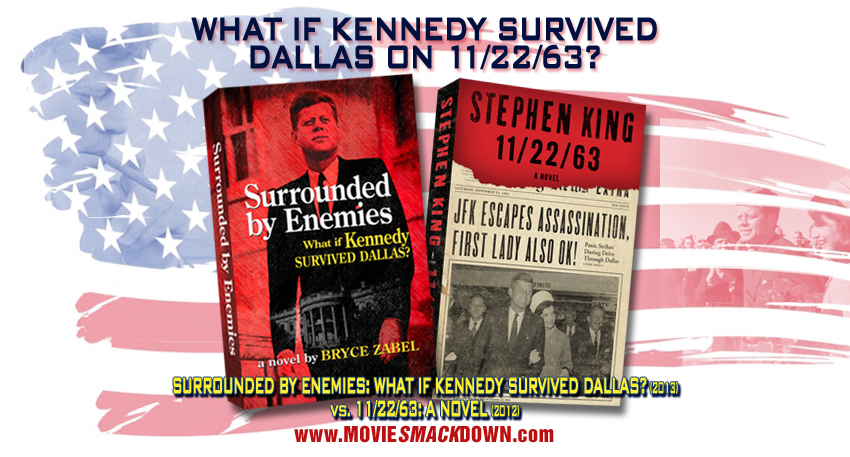
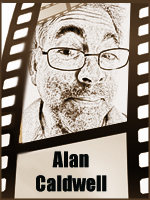 The Smackdown
The Smackdown
The date is indelibly etched in the memories of everyone who was alive then: 11/22/63. Until 9/11, it was the most shocking, tragic, unimaginably ghastly national event we had witnessed. In the half-century since, what Boomer hasn’t wondered how the Sixties might have improved if President Kennedy’d had the opportunity to complete two terms in office, and not just 1000 days. Sure, we still got the Beatles and the Apollo mission, and on LBJ’s watch the Civil Rights movement blossomed, but then we got mired in Vietnam and Watergate and even more, horrid assassinations.
The assassination also produced a cottage-industry of JFK-themed films and books, ranging from memoirs to analyses of his life and legacy, but by far the most prevalent have been those that (like Oliver Stone’s JFK) have questioned the Warren Commission’s report, which concluded that Lee Harvey Oswald acted alone. Many of these works also speculate about JFK’s second administration and how it would have changed history.
For this special, bonus-edition Smackdown, we’ve got heavyweight champion Stephen King going mano-a-mano with none other than Señor Smackdown himself, Bryce Zabel. What makes this pairing especially juicy is that, though both contenders are no strangers to producing award-winning popular film/TV entertainment — a remake of King’s Carrie, based on his debut novel, is once again rattling theatergoers — we’re taking a rare detour into the universe of literature.
And by universe, we mean “parallel universe,†as their respective books’ subtitles suggest. One is a time-travel fantasy, the other an alternate-history fable — both featuring “what if?†plotlines that emanate from a world that never was, but could’ve sort of might’ve almost been. Maybe.
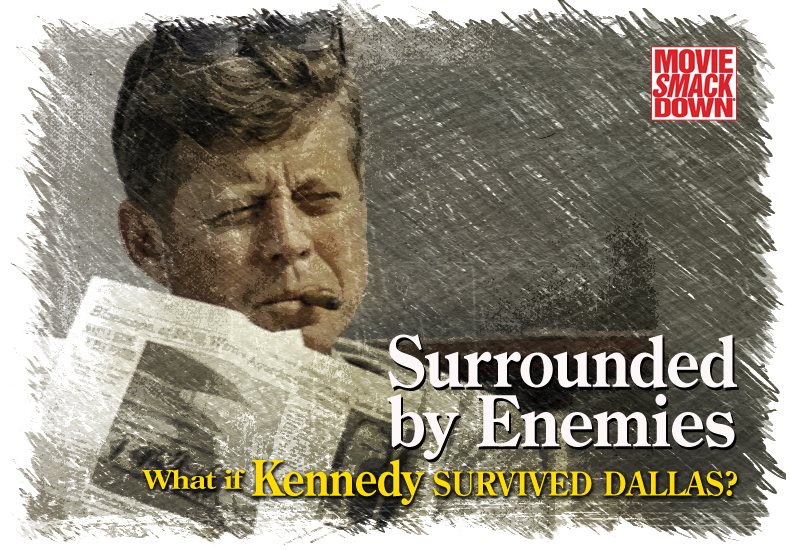 The Challenger
The Challenger
Ever since the Warren Commission report concluded that JFK was the victim of lone assassin Lee Harvey Oswald, cynics and doubters have discovered and presented an abundance of evidence that suggests the contrary.
For the past decade, Bryce Zabel has immersed himself in JFK research, facts and lore alike, and has emerged with a hard-hitting method of delivering some hard truths. Rather than a polemic on the validity of conspiracy theories, the award-winning TV writer/producer has wrapped his thesis in an entertaining plot. At the core of his new book Surrounded by Enemies: What if Kennedy Survived Dallas? is the clever premise that JFK escapes Dallas unscathed and returns to Washington with a monomaniacal mission to find out who tried to murder him in broad daylight. He enlists the aid of his attorney-general brother Bobby. And of course there are culprits aplenty, just as in all the non-fiction conspiracy-theory tomes, but now we see them come to life, just like JFK himself. Furthermore, Zabel captures the Sixties zeitgeist, incorporating iconic characters ranging from Marilyn Monroe to Neil Armstrong and even the Beatles. The pleasures are found in the details — he’s even gone so far as to imagine a JFK-themed risqué shtick from hipster comedian Lenny Bruce. We are treated to a completely surprising — but entirely plausible — tragic scenario when, because of his own real-world foibles, JFK’s presidency does not play out as dazzlingly as we hoped. Indeed, his political career is at risk of crumbling like a house of dominos, as the freewheeling, risk-taking Lothario president is always just one scandalous headline away from disaster.
While we’re on the subject, a similar book published this month, If Kennedy Lived: The First and Second Terms of President John F. Kennedy, by political pundit Jeff Greenfield, covers similar turf, but from an entirely different angle. A popular columnist and TV commentator, Greenfield has been down this path before, with his “what if?†collection, Then Everything Changed, in which he imagines how the fates of several modern presidencies could have been easily altered by a split-second alteration of action or decision. Greenfield has now devoted an entire book to imagining a full eight-year Kennedy administration — one that is devoid of any in-depth discussion of conspiracy theories or how an attempted assassination would logically alter JFK’s behavior. It covers the ’64 campaign and probable differences in the outcomes of Vietnam, civil rights, the Cold War — with well reasoned arguments rooted in real-world considerations — but is more the handiwork of an accomplished essayist than a dramatist.
The Defending Champion
King’s novel is a curious hybrid, in that it’s an elaborate time-travel fantasy that sets out to derail Oswald’s mission, but ultimately with no meaningful consequence. King set out to write this book in 1972, but his full-time teaching duties prevented him from researching it, and “even nine years after the deed,” he said, “the wound was still too fresh.â€
Still, 11/22/63 is, paradoxically, barely a JFK book at all. In this 842-page extravaganza, Kennedy himself is not even a character. The protagonist is middle-aged English teacher Jake Epping from Maine (King country) who, via a porthole through time (conveniently located in the storeroom of his friend’s diner), zips back to 1958 so he can spend five years (with a new identity) trying to stop Lee Harvey Oswald in his tracks. Oh, there’s lots more along the way — falling in love, saving other lives — but that’s the gist.
The big confrontation in the Texas School Book Depository doesn’t happen until page 743: As Oswald raises his rifle, Epping pulls out his .38: “Lee! Stop, you son of a bitch!†He shoots and misses, but it’s enough to ruin Oswald’s shot, and nobody’s hurt… until Oswald is spotted by police from the street below and blown to smithereens.
But then history goes topsy-turvy. Upon returning to the present, he discovers that, yes, Kennedy got re-elected, barely beating Barry Goldwater. All of LBJ’s great Sixties civil rights reforms never happen. George Wallace is elected as our next president and nukes Hanoi. The Beatles reunite for a Peace Concert, only to have a suicide bomber kill 300 audience members and blind Paul. The succession of U.S. Presidents wavers between reality and make-believe: Humphrey, Reagan and Clinton — but not Bill, who died of a heart-attack. And there’s still 100 pages to go, much of which are taken up with the supernatural element of inexplicable earthquakes causing inestimable damage.
The Scorecard
King blithely dismisses conspiracy theorists: “After reading through a stack of books and articles on the subject almost as tall as I am, I’d put the probability [that Oswald was the lone gunman] at 98 percent, maybe even 99 percent. The stodgy ole Warren Commission was right… It is very, very difficult for a reasonable person to believe otherwise.â€Â Zabel, on the other hand, clearly relishes the intricacies of conspiracy theories and has not only done his homework, but has cleverly woven his plot around them, literally bringing them to life — and along with them, JFK himself.
King delivers a leisurely paced, meandering tale, chock full of characters and incidents and episodes, that ambles along, over a period of years, before we even arrive at 11/22/63. Zabel launches his narrative right then and there, at Dealey Plaza, wasting no time getting straight to the main event, and galloping full speed ahead from there — with the central plot focusing on the aftermath. King gives us literal earthquakes, which have no emotional jolt. Zabel gives us metaphoric earthquakes — starting with a Constitutional crisis that threatens to take down JFK’s reputation and career — that lend themselves to greater visceral engagement.
Zabel frames his novel as a fictitious newsmagazine’s 50th-anniversary retrospective, which is infinitely more imaginative than King’s shopworn time-wormhole conceit. Bonus: In contrast to King’s interminable oceans of text, Zabel spices up his lively prose with clever faux-magazine covers portraying alt-world events (JFK meets the Beatles!), created by Smackdown’s resident graphics guru, Linda Karr.
There’s a basic scientific theorem that says, “If it happens, then it must be possible.†The corollary, adopted by Hollywood and conspiracy scholars alike: “If it didn’t happen, that doesn’t mean it’s impossible.†By telling us what could have happened, Zabel tells us more than some historians who have purportedly told us what did happen. His alternate history feels remarkably real.
Best of all, in Surrounded by Enemies, the protagonist is JFK himself — playing Sherlock, with his brother Bobby as Watson — solving the crime of the last half-century: his own (attempted) murder. In Hollywood terms, it doesn’t get any more high concept than that.
The Decision
It’s thrilling to imagine alternate realities — not just big-scale ones, like “What if the South won the Civil War?,†but how a split second can save, or ruin, everything. Add a time-travel element, and it’s a theme that Hollywood finds irresistible, whether it involves a hero going back in time to save the world (Arnold Schwarzenegger’s Terminator series), save the girl (Denzel Washington’s Deja Vu), or save himself (Bruce Willis’ Looper). Add comedy, and you get Michael J. Fox’s Back to the Future trilogy. But even without time-travel, it’s fun to gaze at parallel universe possibilities, as in Gwyneth Paltrow’s underrated Sliding Doors. It enables us to ponder our own lives and reconsider all those junctures when we zigged back and to the left, when we could’ve (should’ve?) zigged right.
If you’ve got time to spare in the future (or — who knows? — maybe the past), delve into 11/22/63 and If Kennedy Lived, both worthy contenders. But by virtue of the book’s well thought-out believability and surefire dramatic sense, we proudly declare Bryce Zabel’s Surrounded by Enemies the winner here. And if you someday return to this space and discover otherwise, then you know that somebody from the future has come back and tried to upend our scoring mechanism. Or maybe they already have! Or… or… or… oh, never-mind, this time-travel, alternate-universe business is giving me a headache!

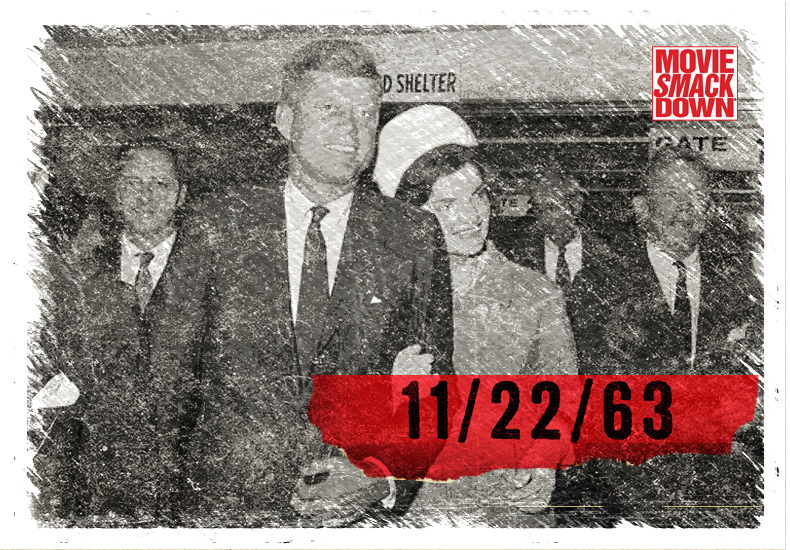

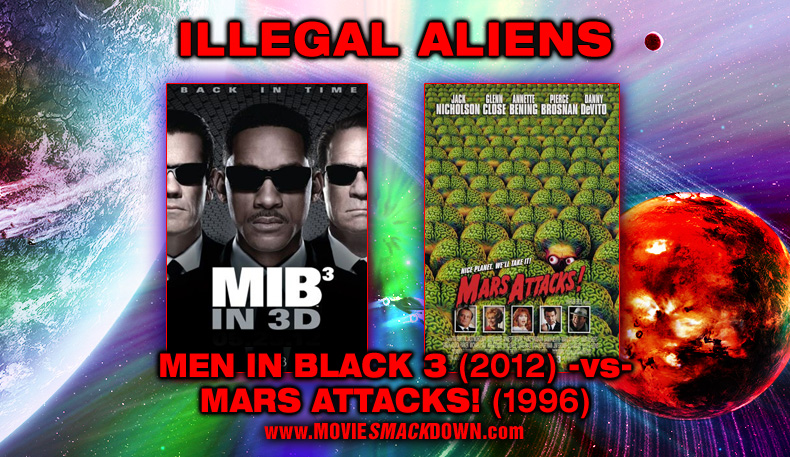

IF JFK had lived,the world would be very different. First and foremost is that in the final weeks of 1963, there would have been an UNFORESEEN crisis with the Soviet Union. With JFK NOT SHOT- ANOTHER WORLD LEADER WOULD HAVE BEEN- KRUSCHEV! ONE MUST REMEMBER, that ONE YEAR LATER HE WAS “REMOVED” FROM POWER. SO THAT “JFK” AND KRUSCHEV WERE CRITICAL TO BE REMOVED IN THE EARLY AND MID-1960’s. SOMEONE WANTED THEM BOTH OUT OF POWER. BOTH WOULD HAVE “INTERFERED” WITH THE COURSE OF THE 1960’s in an UNDESIRABLE WAY. THIS CRISIS WOULD HAVE BEEN OVER BERLIN AND CUBA. IT PROBABLY WOULD HAVE ESCALATED TO W.W.3.